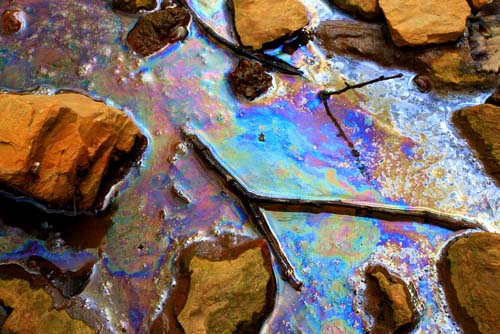Oil on the Water – Issues with Oil Spills
Oil spills on water can be big or small, but on whatever scale, they mean trouble. Oil and water don’t mix, but they can spell real problems for the environment. Even a small amount of petrol or other hydrocarbons can contaminate a waterway and kill animals in contact with the water. Larger amounts can wipe out local ecosystems, from bacteria to large animals and fish.
Big oil spills are a good example of the dangers that oil in waterways or the ocean can cause. If you’ve seen the pictures of birds covered in oil or marine wildlife suffering from the toxic effects of swimming or getting trapped in oil, that’s only part of the story.
The chemistry of oil is another problem for local environments, it means years of recovery and decontamination.
Long Term Issues with Oil Contamination
Oil, unless thoroughly removed, is what’s called a “persistent hazard” in the environment. It’s the equivalent of a major disaster, except it only stops when the oil is eradicated from the environment. Crude oil breaks down very slowly and can be toxic for years. Other refined oils are also highly toxic. There’s no such thing as a “good” oil spill.
The net effect of this is turning a healthy environment in to a dangerous, toxic one. The cost to the human environment is also huge:
- Destruction of fish breeding grounds through both toxicity and increase in fish fry predators like jellyfish.
- Crashing local marine microbiota, and animal and marine flora populations. This basically destroys the food chain in the spill area.
- Serious hazards for local water usage
- Contamination of beaches and waterways, further stressing a damaged ecosystem and future legal liability.
- Anoxic areas can promote dangerous algal blooms like red tides and blue-green algae, which are very toxic environmental hazards.
Oil Spills: The Global Big Picture
Oil spills like the catastrophic spill in the Gulf of Mexico, Exxon Valdez, and other large spills highlight the typical image of local disasters. This, if anything, is a superficial view of global hazards.
Oil usage worldwide is very high. Minor spills happen on a regular basis. Minor spills can cause significant damage in their local areas and these spills are almost daily events. The new response is to manage oil spills as soon as possible, minimising the impact and detoxifying affected areas much more effectively.
It’s now possible to “intercept” oil spills before they become serious hazards. New technologies can manage volumes of oil quickly and efficiently, reducing the risk of persistence in the environment.
Looking for Advanced Oil Spill Management Services?
Oleology is your Australian and New Zealand oil spill expert. If you’re looking for oil spill services, technical support, or systems to help you manage oil spills, contact us online or call us on 1300 692 359 for any services you need. We also provide consultancy services and solutions for business and government organisations.



